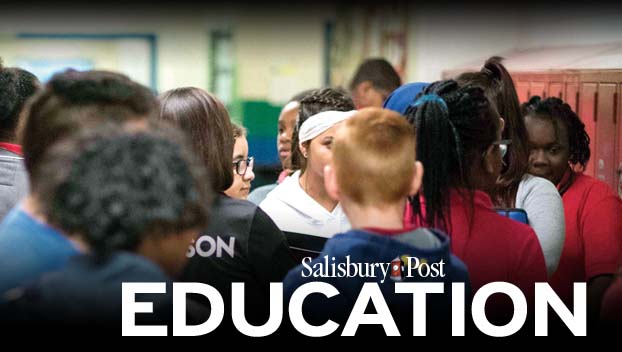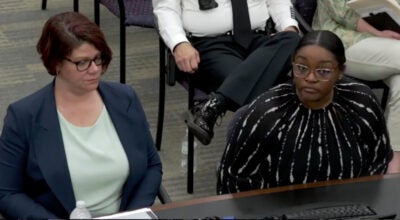Education briefs: Salisbury native honored as 2021 New Century Workforce Scholar
Published 12:00 am Thursday, April 1, 2021
John “Dylan” Whitley, a turfgrass management student at Central Piedmont Community College, has been named a 2021 New Century Workforce Scholar.
The Salisbury native will receive a $1,250 scholarship in recognition of this accomplishment. More than 2,000 students were nominated for the scholarship from more than 1,200 college campuses across the country. Only one New Century Workforce Scholar is selected from each state; and Whitley was chosen as the North Carolina recipient.
New Century Workforce Scholars are selected based on their academic accomplishments, leadership, activities and how they extend their intellectual talents beyond the classroom. Whitley matched the award’s criteria well. As a Central Piedmont student, he is involved in the college’s Student Life activities as a member of the Turfgrass Club and Phi Theta Kappa Honor Society, while excelling inside the classroom with a 3.8 grade point average.
“Dylan is an exemplary student, and he is motivated to reach his academic goals by his desire to provide a good life for his family, and as a new dad,” said Jen Conway, a Phi Theta Kappa All-USA nominator and Student Life coordinator at Central Piedmont. “Phi Theta Kappa recognizes leadership as one of our hallmarks, so Dylan’s application stood out as he discussed his approach to leadership and the care that should be given to employees. Leadership can come from anywhere, no matter your title, and Dylan reflected on that sentiment as he detailed the importance of being a leader, not just a boss. We were excited to nominate him, and thrilled he represents Central Piedmont and our chapter, as the winner from North Carolina,” Conway added.
The New Century Workforce scholarship, sponsored by the Coca-Cola Foundation and Phi Theta Kappa Honor Society, is the first of its kind to support students at associate degree-granting institutions on a national scale as they plan to enter the workforce upon the completion of a degree or certificate. Whitley is currently finishing up his associate degree in turfgrass management at Central Piedmont, and plans to secure employment in the industry after graduating in December.
“We congratulate Dylan for receiving this prestigious scholarship, and we are honored to partner with The Coca-Cola Foundation to recognize his outstanding achievements,” said Phi Theta Kappa’s President and CEO Dr. Lynn Tincher-Ladner. “Scholarship programs like this are integral for creating opportunities for students to succeed as they prepare to enter the workforce and for putting college completion within reach.”
Whitley, and his fellow New Century Workforce Scholars, will be recognized in the fall.
RSS takes the NC First in FAFSA Challenge
Rowan Salisbury Schools have officially accepted North Carolina’s First in FAFSA Challenge to help send more local high school seniors to college. Carson High School, East Rowan High School and West Rowan High School are all competing against each other and hundreds of other high schools across the state to increase their FAFSA completion rates.
myFutureNC, along with Carolina Demography, College Foundation of North Carolina, College Advising Corps, the Hunt Institute, and the John M. Belk Endowment, are sponsoring the NC First in FAFSA School Challenge to motivate students to take full advantage of free federal aid to help them pay for college. Studies show students who complete the FAFSA are far more likely to enroll in higher education.
“The FAFSA is the first step to free or affordable college so we are thrilled to see 100% of our school districts across North Carolina participating in our First in FAFSA Challenge,” said Cecilia Holden, CEO of myFutureNC. “We are especially grateful to the district leaders, school principals, counselors, faculty, and staff at these high schools who are helping so many students and their families complete the FAFSA and take that first step for a lifetime of opportunity and success.”
NC First in FAFSA launched the inaugural FAFSA Challenge this semester to encourage high schools to earn the highest FAFSA completion rate and implement innovative strategies to support FAFSA completion locally. 494 North Carolina high schools or 75% of public high schools across the state have registered for the challenge.
Schools compete in the Challenge with schools of similar size and type, with winners earning a $500 grant in each of the following categories:
- Highest percentage of completed FAFSAs
- Highest percent increase in FAFSA completion rate
- Best FAFSA completion strategy
The Challenge will conclude on June 30 with winners announced by July 31st, 2021. Schools can keep track of their progress with the NC First in FAFSA Tracker to identify specific areas of need and create targeted efforts to increase attainment. Final FAFSA completion rates are calculated using FAFSA completion data from the U.S. Department of Education and final high school graduation counts from NC DPI.
Updates to the leaderboard are made on the second Tuesday of each month. Winners will be announced in Summer 2021.
Education Lottery raises $8 billion to date for education
RALEIGH – North Carolinians got their first chance to play the lottery 15 years ago on Tuesday – March 30, 2006 − and since then the fun and games have raised $8 billion for education programs in North Carolina.
At the current level of sales, the lottery raises on average $2 million a day for education.
Mark Michalko, executive director of the lottery, said the lottery’s record of success results directly from the strong support of North Carolinians who enjoy playing lottery games and winning prizes while at the same time helping a good cause − public education.
“Every ticket that is purchased provides money for education,” Michalko said. “We’re proud to play our part in supporting our students and schools and will work to continue this success for the next 15 years.”
This year, based on allocations made by the N.C. General Assembly, the money raised by the lottery supports the costs of school workers in all school systems; helps to build and repair schools in all 100 counties; helps to make college more affordable to students attending state universities and community colleges, supports the N.C. Pre-K program for at-risk four-year-olds, and helps cover the costs of school transportation. And under a new school construction program created four years ago, 30 counties in North Carolina have received grants of $10 million to $15 million to help build new schools.
Here are some highlights of the lottery’s first 15 years:
- About 95 cents of every dollar spent on a lottery ticket cycles back into the state’s economy as either a prize, earnings for education, or a sales commission to a retailer.
- The most popular games are instant games with a total of 762 different scratch-off tickets so far.
- The lottery holds the highest level of responsible gaming certification recognized internationally and was the 4th U.S. lottery and the youngest at that time to meet the requirements for the certification.
- Total prizes won add up to an estimated $18 billion, including seven Powerball or Mega Million jackpot wins ranging from $12 million to $344.6 million.
- More than 7,100 retail locations across North Carolina, including some of the state’s most well-known retail brands, sell lottery tickets. That’s up from up 5,000 the day the lottery started.
- With $3 billion in annual revenues, the lottery has grown into one of the state’s most successful sales and marketing organizations.
Treasure Feamster Scholarship available
The Interdenominational Ministers Fellowship scholarship committee is accepting applications for the 2021 Treasure Feamster Scholarship through April 9. The scholarships are available for high school seniors who are members of a fellowship-affiliated church, regardless of field of study. Students can check with their guidance office or affiliated churches or call 704-639-1894 or 704-433-3277.
Catawba College to host Pulitzer Prize-winning journalist
SALISBURY – Catawba College will host David Zucchino, Pulitzer Prize-winning journalist and author of the book, “Wilmington’s Lie: The Murderous Coup of 1898 and the Rise of White Supremacy,” at a student-led panel discussion open to the community.
The virtual event will be held on Thursday, April 8, at 11:30 a.m. Panelists include students from Catawba College, Hood Seminary, Livingstone College, and Rowan-Cabarrus Community College.
Event organizers Mercedes Quesada-Embid, Associate Professor of Environmental Policy and Advocacy, and Andrew Jacobson, Assistant Professor of GIS and Conservation in Catawba’s Department of the Environment and Sustainability, said that “Wilmington’s Lie” will allow for a broader platform of discussion surrounding race relations and systemic discrimination, as well as long-awaited institutional empowerment centered on the importance of societal healing.
The panel discussion is sponsored by Catawba’s Equity, Diversity, Justice and Inclusion Task Force.
The event is open for everyone in the community to join remotely. Attendees may access it live at catawba.edu/davidzucchino.
Copies of “Wilmington’s Lie” book are available at South Main Book Store in Downtown Salisbury. South Main Book Store will also host a book signing with the author after the panel discussion from 4 to 6 p.m.
Zucchino, a contributing writer for The New York Times, has covered wars and civil conflicts in more than three dozen countries. His latest book was a “Best of January” selection at Amazon, a “Book of the Week” at three outlets – Publishers Weekly, the New York Post, and Literary Hub — and a “2020 Title to Watch” at A Literary Journal.
Zucchino won the Pulitzer Prize for Feature Writing for his series, “Being Black in South Africa,” in 1989 while writing for The Philadelphia Inquirer. He is also a four-time Pulitzer finalist for coverage of Lebanon, Africa, inner-city Philadelphia, and Iraq. He is the author of two other books, Thunder Run: The Armored Strike to Capture Baghdad, 2004, and Myth of the Welfare Queen, 1997.
More News




